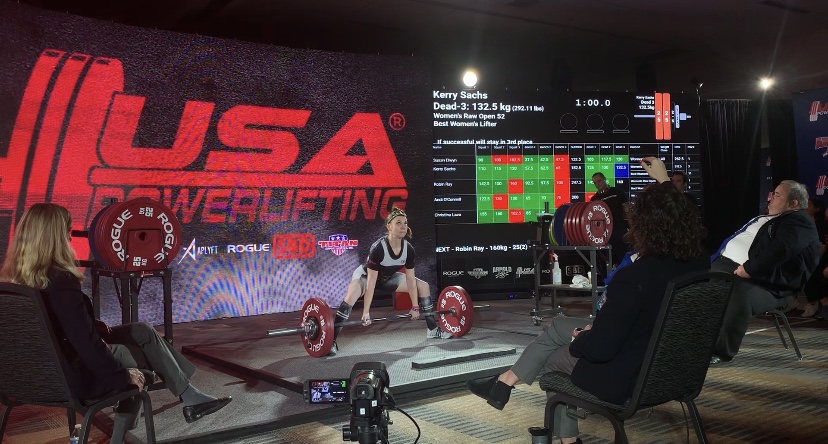Written by: Kevin Cann
John Wooden, the legendary UCLA basketball coach once said, “Be quick, but don’t hurry.” This quote was to teach certain skills to his basketball players. You need to be quick to beat your opponent, but the second you begin to hurry mistakes are made. This applies to powerlifting also.
Powerlifting is a sport where slow incremental progress becomes inevitable after the initial beginner gains. I think many people get fooled here because they believe beginner gains only happens for the first few weeks or months. Beginner gains can easily last for 2 to 3 years.
This can cloud the judgment of the lifter and alter expectations to be higher than what reality is. This can lead to the lifter becoming very frustrated and when we become frustrated our decision making can become clouded with emotional reactions. This often leads to the lifter jumping from program to program or coach to coach and also can lead to the lifter trying to force the issue more in training.
To echo John Wooden, we need to be patient in training, but also act with a sense of urgency. We all know the lifter that posts their lifts with RPEs and will grind out a single and record it as a RPE 7. This is a lifter that is attempting to force results instead of just being present during training and making good decisions.
You will get rewarded from being present in training, having the self-awareness and integrity to be honest with yourself, and challenging yourself slightly beyond your skillset. That challenge level is too little, and you will not get better. If it is too much we move into a threatened state and will see performance and the ability to recover both decrease.
We need to be patient, with a sense of urgency. We cannot try to force the issue. Sometimes we will try and we will convince ourselves that we are just pushing ourselves and challenging ourselves. Often this weakness is a lack of self-awareness. There is something deep down inside of us that is pushing us to make those decisions. Figuring out why becomes important.
Our “why” is going to guide the decision process no matter what. Even if you don’t think that you have an answer to that question, there is an internal why driving you. You need to know what the answer is and let the appropriate answer guide you.
Perhaps the lifter that is stretching their RPEs is frustrated in their everyday life. They feel they are stuck and not making progress in life, so they attempt to force the issue in the sport of powerlifting. Sports are awesome because they will teach life lessons.
The life lesson here is to be patient and focus on doing the things that you need to do. You can only control the controllable. You can’t control when you will hit a PR, but you can control your attitude and effort. Once the mind and body are well aligned, the performance will follow.
This is easier said than done. Our ego is very cunning and will attempt to cloud our judgment and tell us logical lies. We may even convince ourselves that we are not the reason for our lack of perceived success, but instead it is a program, a coach, or life’s stressors being thrown at us. Of course, those things can have an impact, but ultimately our performance is our responsibility. The coach is a guide along for this journey.
The program should give the lifter opportunities to learn these lessons and the coach is there to be sure that they learn them and to help them develop the tools to navigate it appropriately. It is a lot more than just writing volumes and intensities.
We see lifters with big totals doing a specific program and we think that is the answer to us getting into the elite category. Elite is elite for a reason and average is average for a reason. Most people are average. A lot of these coaches get a lot of athletes in front of them and eventually one of those athletes is going to be very gifted in the sport. For every gifted lifter there are hundreds that they coach that are average doing the exact same program. However, we do not hear about those lifters and how the coaches are adjusting the issues that arise with those lifters that are seeing less than optimal results.
Instead, they just ignore those lifters, and share all the success stories on the internet. Coaches seem to coach to the strongest lifters, and I disagree with this strategy. I choose to coach to the weakest lifter because if I can get results from them, the more talented lifters become easier.
There is a certain amount of work that is necessary to become a high performer. We need to identify barriers to that level of work in the lifters that are not capable of getting it down. The physical planning for this is easy, but there is a human side to this. If a lifter does not trust themselves or believe in themselves, the physical planning is pointless as they will find ways to make that negative narrative true.
Once they develop that self-awareness and the identify the areas that they need to improve, and they put the work in, their intuition in the gym becomes much stronger. They can view training from a mindfulness perspective without judgment or emotion. This allows them to be patient, but also to understand where that challenge line is drawn and to step up to it without being threatened.
This where the paradox of being patient, but having urgency becomes fully understood. This is where a high level training skill resides.

